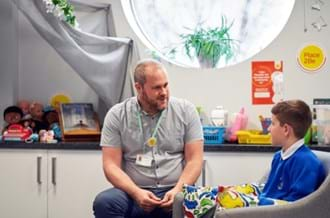School Senior Mental Health Leads – what do we know so far?
School Senior Mental Health Leads – what do we know so far?

Marina Smith
Marina, Head of Mental Health and Wellbeing Programmes, joined Place2Be in May 2022. She has 20 years of experience working with young people and adults across substance misuse and addiction services. She has an MSc in Development Management and is passionate about steering systemic change to address health inequalities and achieve social justice.
Marina Smith, Head of Mental Health and Wellbeing Programmes at Place2Be, takes a look at our first year delivering the Senior Mental Health Leads programme.
In 2018, the Department for Education (DfE) and the Department of Health and Social Care jointly published Transforming Children and Young People’s Mental Health: A Green Paper. The Green Paper set out an ambition for “earlier intervention and prevention, a boost in support for the role played by schools and colleges, and better, faster access to NHS services.”
In the Green Paper, the Government committed to incentivising schools and colleges to recruit and train a Senior Mental Health Lead (SMHL). They pledged to offer funded training to every state school and college in England by 2025.
The Government rolled out the grants programme to schools in the autumn of 2021. During the rollout, various organisations, including Place2Be, became DfE-assured Senior Mental Health Leads training providers.
As we approach the end of our first academic year of delivering the programme, it feels like an appropriate moment to reflect on what we’ve learned.
Who are the Senior Mental Health Leads?
Of the Senior Mental Health Leads that have chosen to train with Place2Be:
- 80% represent primary schools
- 20% represent secondary schools.
These stats partially reflect the proportions of primary and secondary schools throughout England.
We welcomed participants from all regions of England, with London and the Southeast making up a large proportion (over 40%).
Place2Be has seen many participants, from Executive Heads to class teachers. Almost half of the participants have been Headteachers or Assistant/Deputy Heads. A further third have other relevant responsibilities relating to mental health and wellbeing, including special educational needs and disability (SEND), safeguarding and inclusion.
Many schools have used their grant money to train one Senior Mental Health Lead. A few have also self-funded a second staff member to complete the training. This approach can have added benefits in terms of increased capacity and longevity of the learning, for instance, where staff members may leave or be absent.
In addition, most participants came from schools that currently do not commission in-school mental health support from Place2Be.
Schools are already doing a lot to promote positive mental health. The programme provides structure to help them formulate a clear plan.
Our programme supports participants in developing a whole-school approach to mental health. The term 'whole-school approach' is used a lot in the sector, but as a school leader, it can be challenging to know where to start.
Our self-assessment tool reflects evidence from research and Place2Be's experience in schools of what contributes to a 'mentally healthy' school. The tool guides participants through thinking about the strategies, policies and approaches in their school that support mental health, what works well and any gaps to focus on.
Over the years, we've found that the school leaders are often pleasantly surprised by how much they are already doing towards a whole-school approach. So, what's working well?
Data from our self-assessment shows Mental Health Leads score themselves highly on:
- Encouraging teachers to maintain a supportive, respectful classroom climate and ethos (6.35 out of 7)
- Promoting an environment which has clear boundaries, positive behaviour and is aspirational (6.25 out of 7)
- Having an anti-bullying policy in place, which includes social media and cyber-bullying (6.19 out of 7)
Engaging all parts of the school community is a challenge.
When it came to the aspects of the whole school approach that schools found most challenging, Mental Health Leads scored themselves lowest in:
- Consulting with staff, parents/carers and children and young people about the school mental health strategy (3.02 out of 7)
- Providing guidance and support for parents/carers. In particular, their attempts to help them understand the impact of parental wellbeing on children (3.36 out of 7)
- Developing non-teaching staff’s awareness and understanding of child and adolescent development (3.56 out of 7)
- Providing opportunities for children and young people to support each other, e.g. peer mentoring (3.47 out of 7)
Taking part in the programme is having a positive impact on children and young people
As part of our ongoing evaluation of the programme, we have surveyed participants to find out more about the impact that their learning is having in school.
Key findings
After completing the programme:
- 98% of respondents felt quite or very confident in identifying what they could do in their role as Senior Mental Health Lead and what they should refer to specialist support
- 98% felt they had a better understanding of their role as an SMHL
- 90% have adopted some practice that they learned from another participant on the course
- 80% felt they now had a clear plan to prioritise their school’s mental health activity after the course, compared to just 30% before.
One of the unique aspects of Place2Be’s programme is the opportunity for every participant to have two individual consultations with a Place2Be clinician. These consultations help ensure that Mental Health Leads can apply their learning to their unique school context.
- 96% of respondents felt that the consultations helped clarify what action they needed to take to achieve their prioritised aims.
- 92% found the consultations helpful for developing their leadership in mental health.
Most importantly, 90% of respondents think some action they have taken as a result of this programme positively impacts pupils in their school.
Overall, we have heard very positive feedback from this programme's first year of delivery, and we look forward to continuing to work with more schools across England in the coming academic year. Most importantly, we know that the programme is positively impacting the lives of children and young people across the country—and we will endeavour to extend that impact as far as possible in the future.
If you haven’t already accessed a grant from the DfE, it’s not too late. You’ll need to check your eligibility and reserve your grant by completing the DfE application service form. You can then book your place on our CPD-certified Department for Education-approved training. The programme will support you to develop your whole school approach to mental health and enable you to prioritise staff wellbeing.
News & blogs

Uniting health and schools to improve mental health
Read Place2Be Chief Executive, Catherine Roche's, thoughts on uniting health and schools to improve mental health.
Read more
Hayley and Jaynie's experiences on Place2Be’s Level 5 Certificate course
Read Hayley and Jaynie's experiences on our Level 5 course and their engagement with our unique therapeutic approach.
Read more
Russell's experience on Place2Be's Level 4 Diploma
Read Russell's experience on our Level 4 Diploma and his desire to encourage more men to consider counselling as a career.
Read more



